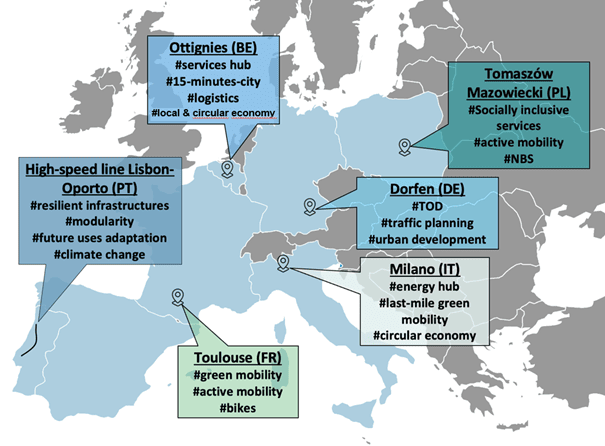The SCP reimagines railway stations as vital urban centers, serving as hubs for socially inclusive services, proximity services, and green mobility. Central to its vision is the idea of 15-minute city, enabling citizens to access essential services within a short distance. By leveraging advanced engineering solutions with a focus on circular economy principles, the SCP champions environmental protection.
RAIL4CITIES sets ambitious objectives, aiming to develop and publish an operational SCP model, an EU-wide methodology, and a transformative tool to turn railway stations into promoters of sustainable cities. The project addresses complex challenges, including profit-oriented business models, intricate stakeholder networks, and policy gaps.
Key Objectives:
- Establish railway stations as new urban vital centers, fostering sustainable cities and resilient infrastructures.
- Develop methodology and tool for the effective and sustainable implementation of the SCP model.
- Activate the European ecosystem and promote achieved results through synergies of investments, including a summer school, an open contest for start-ups, and roadshows (scheduled between July and October 2024).
RAIL4CITIES introduces living labs in five European countries, each dedicated to transforming stations into green, inclusive, and energy-efficient mobility hubs. Let’s delve into the specifics of each living lab:
France: Toulouse-Matabiau Railway Station (SNCF Hubs & Connexions)
-
- Focus: Station as a hub of green, inclusive, and energy-efficient mobility coupling public transport with new mobility modes (bikes, scooters, e-scooters, cargo bikes, car sharing, etc.) with particular emphasis on bikes.
Italy: Milan-Rogoredo Railway Station (RFI and Metropark)
-
- Focus: Railway station as an energy hub and circular economy hub implementing various projects concerning energy and sharing-and-micro mobility.
Poland: Tomaszów Mazowiecki Railway Station (PKP)
-
- Focus: Station as a “socially-inclusive service hub” promoting social integration through new services and mobility offers. Also, exploring Nature-Based Solutions (NBS) for environmental protection due to the city’s proximity to natural ecosystems.
Germany: Dorfen Railway Station (DB)
-
- Focus: Sustainable station & Transit Oriented Development (TOD).
Belgium: Ottignies Railway Station (SNCB / NMBS)
-
- Focus: Transforming the station into a services hub that promotes the 15-minute city concept by fostering a 24-hour living environment and creating a vibrant and welcoming station atmosphere, while prioritizing the integration of local and circular economy principles as much as possible.
Additionally, the project plans to study the resilience of infrastructure to facilitate the adaptation of spaces for future uses and to address climate change and health crises.
RAIL4CITIES adopts innovative approaches, integrating in-depth primary data analysis, multi-stakeholder engagement, and resource utilization negotiations to address challenges effectively. The deployment of living labs includes regular meetings to update progress and identify common solutions, fostering shared learning experiences among living labs involving citizens. This approach involves placemaking activities aimed at allowing communities to take ownership of the spaces inside and around stations, transforming them into vibrant “places”.
The project emphasizes the significance of comprehending the station context, engaging users, analyzing data, and ideating to devise solutions. RAIL4CITIES signifies a steadfast commitment to transforming railway stations and their surrounding areas into sustainable urban spaces by involving citizens and engaging in placemaking activities. The progress observed in living labs highlights the significance of innovation, collaboration, and adaptation to overcome challenges. As living labs continue to evolve, they significantly contribute to shaping a roadmap for sustainable and resilient cities across Europe.
